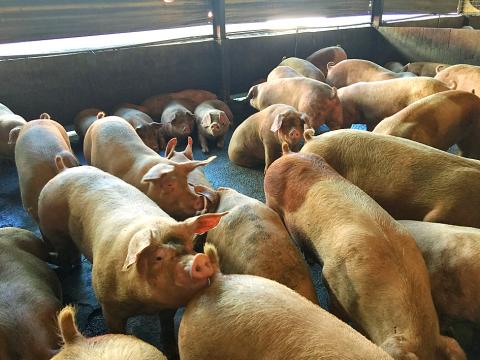The Council of Agriculture should require vehicles transporting pigs to install GPS devices for retroactive tracking in the event that African swine fever enters the nation, veterinary experts said yesterday.
Since China reported the first infection in early August last year, the council has been increasing its quarantine measures against the disease, while experts continue to identify possible loopholes.
At a meeting with council officials yesterday, academics urged the council to close quarantine loopholes and brace for the worst-case scenario if unfortunately the disease enters the nation.

Photo: CNA
The disease can be latent for up to 15 days and the council should think about how to track transmission if any infection is reported, National Chung Hsing University Department of Animal Science dean Chen Chih-feng (陳志峰) said, adding that the fight against the disease could last for decades.
Chen suggested pig transportation vehicles install GPS devices, which was seconded by many other experts.
While environmental authorities have required vehicles at meat processing plants to install such devices, it is more difficult to require hog farms to do so, given that smaller farms use their vehicles for various purposes, including delivering groceries, Bureau of Animal and Plant Health Inspection and Quarantine official Peng Ming-hsing (彭明興) said.
Chinese Culture University Department of Animal Science dean Lo Ling-ling (羅玲玲) also urged the council to conduct surveys of pet pigs and wild pigs nationwide, as they are also virus transmission channels.
National Taiwan University veterinary medicine professor Chou Chin-cheng (周晉澄) said there are insufficient sniffer dogs to identify illegal meat imports at customs.
Council of Agriculture Deputy Minister Huang Chin-cheng (黃金城) said there are 47 sniffer dogs on duty at customs, adding that the council is seeking a larger budget from the Executive Yuan for sniffer dog training.
As illegal pork products are often carried by Chinese visitors, their check-in luggage would be gathered on the same carousels at airports for checks, he said.
While the content of check-in luggage would be scanned by X-ray devices, not all carry-on luggage items would undergo examination, especially as customs officials at Taiwan Taoyuan International Airport only sample a few for checks, Huang said.
To plan for more comprehensive quarantine measures, the council is to meet with customs and airport representatives tomorrow, Peng said.
Meanwhile, the Taipei Animal Protection Office yesterday said that the examination of the body of a dead pig found in downtown Taipei on Monday showed that it was not infected with African swine fever.
The dead musk pig weighing about 150kg was found in Lane 632, Heping E Road Sec 3 in Daan District (大安) at about 11am on Monday, the office said.
As the carcass was slightly swollen and redness was observed on its abdominal area, the carcass was sent to the Animal Health Research Institute for examination.
Disinfection measures were taken at the site, the office said, adding that about 50 pigs being raised at National Taiwan University College of Bioresources and Agriculture’s Experimental Farm, within a 3km radius of the site, showed no signs of illness.
The office urged people to report finding a dead pig or suspected pork products imported from areas where African swine fever is spreading by calling the 1999 public service hotline in Taipei or the council’s smuggling prevention hotline at 0800-039-131.

Taiwanese can file complaints with the Tourism Administration to report travel agencies if their activities caused termination of a person’s citizenship, Mainland Affairs Council Minister Chiu Chui-cheng (邱垂正) said yesterday, after a podcaster highlighted a case in which a person’s citizenship was canceled for receiving a single-use Chinese passport to enter Russia. The council is aware of incidents in which people who signed up through Chinese travel agencies for tours of Russia were told they could obtain Russian visas and fast-track border clearance, Chiu told reporters on the sidelines of an event in Taipei. However, the travel agencies actually applied

Japanese footwear brand Onitsuka Tiger today issued a public apology and said it has suspended an employee amid allegations that the staff member discriminated against a Vietnamese customer at its Taipei 101 store. Posting on the social media platform Threads yesterday, a user said that an employee at the store said that “those shoes are very expensive” when her friend, who is a migrant worker from Vietnam, asked for assistance. The employee then ignored her until she asked again, to which she replied: "We don't have a size 37." The post had amassed nearly 26,000 likes and 916 comments as of this

New measures aimed at making Taiwan more attractive to foreign professionals came into effect this month, the National Development Council said yesterday. Among the changes, international students at Taiwanese universities would be able to work in Taiwan without a work permit in the two years after they graduate, explainer materials provided by the council said. In addition, foreign nationals who graduated from one of the world’s top 200 universities within the past five years can also apply for a two-year open work permit. Previously, those graduates would have needed to apply for a work permit using point-based criteria or have a Taiwanese company

The Shilin District Prosecutors’ Office yesterday indicted two Taiwanese and issued a wanted notice for Pete Liu (劉作虎), founder of Shenzhen-based smartphone manufacturer OnePlus Technology Co (萬普拉斯科技), for allegedly contravening the Act Governing Relations Between the People of the Taiwan Area and the Mainland Area (臺灣地區與大陸地區人民關係條例) by poaching 70 engineers in Taiwan. Liu allegedly traveled to Taiwan at the end of 2014 and met with a Taiwanese man surnamed Lin (林) to discuss establishing a mobile software research and development (R&D) team in Taiwan, prosecutors said. Without approval from the government, Lin, following Liu’s instructions, recruited more than 70 software